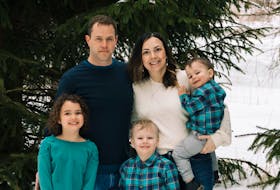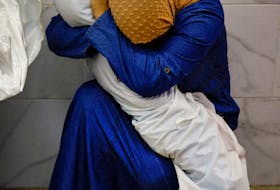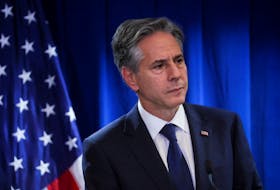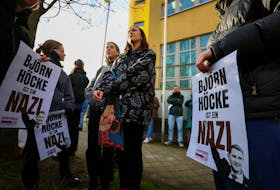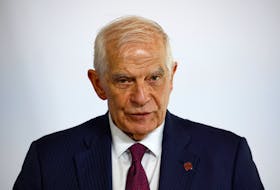A group of now elderly men abused as boys in the Mount Cashel Orphanage lost their civil fight in Newfoundland and Labrador Supreme Court to have the Roman Catholic Church held responsible for what happened to them several decades ago.
In a decision released almost a year and a half after the civil trial clewed up and nearly two years since it began, Justice Alphonsus Faour said the church can’t be held legally responsible for the illegal abusive actions of certain members of the lay order Christian Brothers.
Furthermore, a second argument was unsuccessful on whether any Catholic officials — having heard of the abuse — failed a duty of care to the boys.
Geoff Budden of Budden and Associates, which launched the case in 1999, said he was disappointed, but he intends to appeal within 30 days.
- Related story: Analysis: How the Mount Cashel civil trial played out in N.L. Supreme Court
- Series on Mount Cashel aftermath: Bitter legacy: How Mount Cashel survivors are living with the aftermath
It has been accepted the four test-case John Does — representative of 60 or more abused residents of the orphanage during the era of the 1940s to early 1960s — did suffer physical and sexual abuse at the St. John’s orphanage, which was demolished in 1992.
But the first nugget of the case was whether the St. John’s Episcopal Corp. was in charge of the lay order that operated the orphanage and should be held liable. Faour found it was not.
Faour said the evidence disclosed no operational control by the archdiocese over the orphanage, as the Christian Brothers’ organization had full control over day-to-day management.
“They were separate corporate entities,” said Faour, citing evidence included in a report by historian John FitzGerald.
As for duty of care, Faour said there was insufficient evidence to find, on a balance of probabilities, that disclosures made in the confessional raised a duty of care, or that nothing was done.
“Apart from speculation about what may have happened, there was insufficient evidence to find there was a breach of a duty of care by the priest, and accordingly, the Archdiocese is not vicariously liable,” he said in the decision.
Faour didn’t discount those who said they disclosed the abuse to the parish priest in and out of confession.
“I do not doubt that disclosures were made. I found the testimony and written statements believable and accepted,” ruled Faour, who said he accepted the parish priest was told something.
“On the second issue (of whether the priest understood what was being told to him), I am left with some doubt about whether the priest received the message as told by the boys. The testimony and statements indicated only seven disclosures out of potentially hundreds of confessions heard by the priest during the relevant period.
“These disclosures may have either not been believed or may have been misunderstood by the confessor. Several of the witnesses, including the plaintiffs, confirmed in their testimony that they were not even certain how to describe what had happened to them. All of them also indicated it was unlikely they would be believed.
“The question of believing their disclosures also must be considered in the context of their times. The reputation of the Brothers was such that no one would have considered this kind of abuse possible. While I believe their testimony, I am not persuaded that the priest would have fully understood what he had been told.”
For victims, the loss of the case was disappointing, but the fact the court did not find for duty of care was crushing, as it suggests victims going up against someone with a good reputation have no chance.
One of the victims, a retired teacher who entered the orphanage in the 1940s, said the boys were not only ashamed of what was happening to them, but were scared to say anything, and the seven who did speak up at the time were brave.
“(The justice) said only seven people. That slayed me. That really slayed me. Is there supposed to be a certain number? If one person came forward, that would be enough to turn the light on. It’s not a game of numbers, it’s a game of truth, of responsibility and duty.”
The boys were also completely immersed in the culture of the religion, he said, and were unlikely to speak out against it. He was among those who did not tell.
“We believed honestly if you hit a priest, your hand would fall off. They were agents to God. The Brothers in there with them,” the man said.
During the course of the trial, the church argued the order was independent and they merely shared a common faith.
The civil trial was covered in its entirety by The Telegram.
The Supreme Court publicly released the 175-page decision Tuesday.
The retired teacher said he supports an appeal, even though it will take another two years or more to resolve, and he has been living with the abuse and its fallout for many decades.
“I am very disappointed. I really and truly was expecting a very positive result. Unfortunately, we didn’t get it,” he said of Faour’s decision. “Especially with the work that Geoff and his associates put into it. … It all seemed to be fitting the puzzle together.”
Budden said there are some findings in the decision that advance the cause of survivors of sexual abuse.
They are, according to Budden, “an expanded definition of ‘misconduct of a sexual nature’ to include the beating of a naked boy, in a shower; the fact that a disclosure of child abuse was made in confession did not free a priest from an obligation to act on it; and what we believe to be the highest judge-awarded damages (contingent on a successful appeal), $1,930,833.87, to a survivor of sexual abuse in Canadian history.”
In a news release issued by the Archdiocese of St. John’s, Archbishop Martin Currie said that while the archdiocese wasn’t responsible for the operation of the orphanage or the school at Mount Cashel, “We have immense sympathy for those who suffered in the past and continue to suffer, as a result of abuse. We ask for prayers for all those involved in this sad matter. There is no winner in this type of court case. All the plaintiffs in this case were deeply wounded by their experience and to that extent my heart is heavy for their pain and suffering. However, the law found the archdiocese was neither vicariously liable nor negligent for the operation of Mount Cashel and the actions of the Christian Brothers.”
On the issue of whether the church was negligent in failing to act after being directly informed of the abuse, Faour said the one incident for which there was evidence was a memo written by the priest-assistant to the archbishop in 1954. He said the available evidence indicated there was follow-up and it was deemed sufficient under both the Canon Law governing the relationship between the archbishop and the Brothers and the civil law.
If the victims had won the case, the decision gives an indication of what they would have received. This could be relevant should they win the appeal, but is cold comfort in the meantime.
One man whose life, marriage and career was ruined, as Budden said, would have received nearly $2 million.
The retired teacher would have received nearly $200,000.
Another man — a retired military officer — would have received more than $400,000 and the fourth man — who was beaten naked in the shower — would have received nearly $80,000.
Pathways, a non-profit group that offers supports and services to survivors of religious institutional abuse and their families, said Tuesday in a statement it is upset about the ruling.
“Though the judge states that he believes witness testimony about having disclosed the abuse to their priest, he gives the church a pass because he finds that abuse of this nature was inconceivable at the time based on the reputation of the Brothers and is not convinced that priests understood what they were told,” founder Gemma Hickey said.
“Based on this line of thinking, I firmly believe there are legitimate grounds for this decision to be appealed. Allowing the force of an alleged reputation to override actual notice from extremely vulnerable children is very concerning to me. Another indication that even today, those fortunate enough to have a ‘good reputation’ will not have to answer for the consequences of their actions.”
Earlier story:
A group of now elderly men abused as boys at the former Mount Cashel Orphanage have lost their Supreme Court of Newfoundland and Labrador civil fight to have the Roman Catholic Church held responsible for what happened to them several decades ago.
In a 174-page decision released almost a year and a half after the civil trial clewed up, and nearly two years since it began, Justice Alphonsus Faour said the church can’t be held legally responsible for the actions of certain members of the lay order Christian Brothers.
The decision will be appealed within 30 days, said Geoff Budden, a lawyer for Budden and Associates.
In a news release issued by the Archdiocese of St. John's, Archbishop Martin Currie said: “While the Archdiocese of St. John’s was never responsible for the operations of the orphanage or the school at Mount Cashel, we have immense sympathy for those who suffered in the past and continue to suffer, as a result of abuse. We ask for prayers for all those involved in this sad matter. There is no winner in this type of court case. All the plaintiffs in this case were deeply wounded by their experience and to that extent my heart is heavy for their pain and suffering. However, the law found the Archdiocese was neither vicariously liable nor negligent for the operation of Mount Cashel and the actions of the Christian Brothers.
It’s been accepted that four test case John Does — representative of some 60 or more abused residents of the orphanage during the 1940s to early ’60s — did suffer physical and sexual abuse at the long-ago razed St. John’s orphanage.
But the first nugget of the case was whether the Roman Catholic Episcopal Corp of St. John's . was in charge of the lay order that operated the infamous orphanage and whether it should be held liable, which Justice Faour found it was not.
Faour said the evidence disclosed no operational control by the archdiocese over the orphanage, as the Christian Brothers' organization had full control over the day-to-day management.
"They were separate corporate entities," Faour said.
The victims were represented by Budden and Associates of St. John's.
Budden noted the clients are disappointed.
"While our clients are pleased they were believed, they respectfully disagree with the findings and legal analysis that led Judge Faour to conclude that the priest/chaplain had no responsibility to act on this disclosed information," Budden said in a news release.
Budden said there are some findings in the decision that advance the cause of survivors of sexual abuse.
They are, according to Budden: "an expanded definition of “misconduct of a sexual nature” to include the beating of a naked boy, in a shower; that the fact that a disclosure of child abuse was made in confession did not free a priest from an obligation to act on it; and what we believe to be the highest judge-awarded damages (contingent on a successful Appeal), $1,930,833.87, to a survivor of sexual abuse in Canadian history."
As for duty of care, Faour said that there was insufficient evidence to find, on a balance of probabilities, that disclosures made in the confessional raised a duty of care, or that nothing was done.
“Apart from speculation about what may have happened, there was insufficient evidence to find there was a breach of a duty of care by the priest, and accordingly, the Archdiocese is not vicariously liable,” he said in the decision.
He didn’t discount those who said they told of the abuse to the parish priest in and out of confession.
“… I do not doubt that disclosures were made. I found the testimony and written statements believable and accepted,” ruled Faour, who said he accepted the parish priest — who lived adjacent the orphanage — was told something.
“On the second issue (of whether the priest understood what was being told him), I am left with some doubt about whether the priest received the message as told by the boys. The testimony and statements indicated only seven disclosures out of potentially hundreds of confessions heard by the priest during the relevant period.
“These disclosures may have either not been believed or may have been misunderstood by the confessor. Several of the witnesses including the plaintiffs confirmed in their testimony that they were not even certain how to describe what had happened to them. All of them also indicated it was unlikely they would be believed.
“The question of believing their disclosures also must be considered in the context of their times. The reputation of the Brothers was such that no one would have considered this kind of abuse possible. While I believe their testimony, I am not persuaded that the priest would have fully understood what he had been told.”
For victims, the loss of the case was disappointing but the fact the court did not find for duty of care was crushing, as it suggests victims going up against someone with a good reputation have no chance.
One of the victims, now a retired teacher who entered the orphanage in the 1940s, told The Telegram Tuesday the boys were not only ashamed of being abused, but were scared to death to say anything, and the seven who did speak up at the time were brave souls.
“(The justice) said only seven people. That slayed me. That really slayed me. Is there supposed to be a certain number? If one person came forward, that would be enough to turn the light on. It’s not a game of numbers, it’s a game of truth, of responsibility and duty.”
The boys were not only afraid of repercussions if any disclosure got back to their abusers, but were also completely immersed in the culture of the religion, he said and were unlikely to speak out against it. He was among those who did not tell.
“We believed honestly if you hit a priest, your hand would fall off. They were agents to God. The Brothers in there with them,” said the man.
During the course of the trial, the church argued the order of Brothers was independent and they merely shared a common faith with the church.
The civil trial was covered in its entirety by The Telegram.
The Supreme Court released its 175-page decision Tuesday.
The retired teacher said he supports an appeal, even though it will take another two years or more to resolve, and he’s been living with the abuse and its fallout for many decades.
“I am very disappointed. I really and truly was expecting a very positive result. Unfortunately we didn’t get it,” he said of Faour’s decision. “Especially with the work that Geoff and his associates put into it. …. It all seemed to be fitting the puzzle together.”
On the issue of whether the church was negligent after being directly informed of the abuse, Faour said the one incident for which there was evidence of was a memo written to by the priest-assistant to the archbishop in 1954. He said that the available evidence indicated there was follow up and it was deemed sufficient under both the Canon Law governing the relationship between the archbishop and the Brothers and the civil law.
If the victims had won the case, the decision gives an indication of what they would have received. This could be relevant should the win the appeal, but is cold comfort in the meantime.
One man whose life, marriage and career was ruined, as Budden said, would have received nearly $2 million.
The retired teacher would have received nearly $200,000.
Another man — a retired military officer — would have received more than $400,000 and the fourth man — who was beaten naked in the shower — would have received nearly $80,000.
Pathways, a non-profit that offers supports and services to survivors of religious institutional abuse and their families, said Tuesday in a statement that it’s alarmed at the outcome.
“Though the judge states that he believes witness testimony about having disclosed the abuse to their priest, he gives the church a pass because he finds that abuse of this nature was inconceivable at the time based on the reputation of the Brothers and is not convinced that priests understood what they were told,” founder Gemma Hickey said.
“Based on this line of thinking, I firmly believe there are legitimate grounds for this decision to be appealed. Allowing the force of an alleged reputation to override actual notice from extremely vulnerable children is very concerning to me. Another indication that even today, those fortunate enough to have a ‘good reputation’ will not have to answer for the consequences of their actions.”

![["The Mount Cashel Orphanage in St. John's. The building was torn down in 1992."]](https://saltwire.imgix.net/cashel-3071208.jpg?cs=srgb&fit=crop&h=568&w=847&dpr=1&auto=enhance%2Ccompress%2Cformat)
